Under the steel framework of the Sukkur Bridge, a symbol of the cityŌĆÖs might and grandeur, sits a woman in her early forties. Her name is Mobeena. Dressed in tattered clothes, with dirt-matted hair and skin calloused from the injustices of life, she sits cross-legged on the corner of the busy Bandar Road. Often found talking aloud to herself, with no one to care for herŌĆöwho is she?
Hers is a tale of abandonment, dejection and neglect. Once someoneŌĆÖs daughter, perhaps someoneŌĆÖs wife or mother, Mobeena now calls the roadside her home. An elderly woman living on the roadside under a bridge, her belongings are wrapped in a ragged potli stuffed behind a black metal pipe. Her life is a resounding reflection of societyŌĆÖs remorseless ill-treatment of widowed and divorced women.
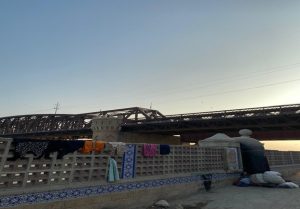
It was a cold November evening when I met Mobeena. She was sitting in her usual corner wearing a green, patched shalwar kameez. Her hair was loose and unkempt, her skin wrinkled and scarred. She was staring at her fingers, talking to herself. I paused for a moment before reaching out to talk to her. It pained me greatly. She was not wearing a dupatta. In a society where dupatta is so strongly associated with a womanŌĆÖs honor and where you wouldnŌĆÖt see, even the most indigent women, without one. It was a cry for help.
Mobeena had no reaction when I approached her. There was no fear in her demeanor and no surprise at having been addressed. Her eyes were empty, and she didnŌĆÖt look at me long. I asked her what her name was. She responded clearly. She was still playing with the dirt in her nails. I asked her why she was sitting there. In broken Urdu, she told me why. There was no emotion in her voice. The grime on the side of her nails was far more interesting to her than anything else. I noticed that she had speech impairment. The traffic jostled past us, untouched. The city moved on, unaware.
I learned that Mobeena was widowed. After the death of her husband, Mobeena was expelled from her house. Having no children of her own and no relatives willing to take her in, she found herself seeking refuge under the Sukkur Bridge. Now, this was her home.
With her husbandŌĆÖs passing away, the existence of Mobeena became meaningless to all those her life was centered on. They not only cut of ties with her but cast her out in the streets. Stripped off any semblance of belonging, she survives on the fringes. One is left to wonder how merciless patriarchy can be towards the women it claims to protect.
Hundreds pass by Mobeena daily, some sparing a glance, others offering a coin or morsel. But few stop to ask why an elderly woman is living alone under a bridge? Where is her family? Where is the state? For the people of Sukkur, this woman has become as much a part of the landscape as the bridge she lives under. Her life is a haunting reflection of societal negligence and the systematic failure of the state to protect its most vulnerable.
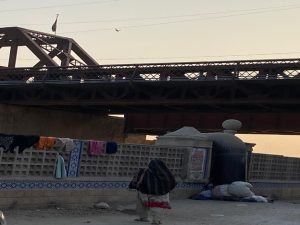
Sukkur city has an unfortunate weather. The summers are sweltering, and the winters are damp and biting. ┬ĀWithout so much as a blanket to cover her, she sleeps on the road.
The uncertainty of the weather is unfortunately not the only threat that descends with the fall of the night. Some days, Mobeena is missing from her usual spot. For those conscious of her presence, these disappearances raise uneasy questions. Where does she go? Is she safe? Who is she with? Has she gone by choice or has someone forced her?
Days pass, and she returns as quietly as she left, sitting cross-legged, her fingers absentmindedly picking at her nails. Her appearance telling stories her words cannot.
The cityŌĆÖs busy population and bustling streets carry on around her normally, a living symbol of the ruthlessness of society towards a woman who doesnŌĆÖt have a manŌĆÖs name to show. The cityŌĆÖs local and political administrations seem indifferent to her plight. The peopleŌĆÖs party banners left and right of where she sits, promising roti, kapra and makaan, just add to the irony of the situation. The collective inaction persists.
ItŌĆÖs been a few days since I have seen her in her old spot. The empty corner, with the potli stashed between the bricks, haunts me every time I pass by. Where is she? Has she found help? Or has her story taken a darker turn? Who is answerable?
Her repetitive disappearance is a grim reminder of the fragility of her existence. It is also a wake-up call for the people of Sukkur and beyond. MobeenaŌĆÖs lives, and countless others like hers, demand our attention, empathy and action.
Where is Mobeena?
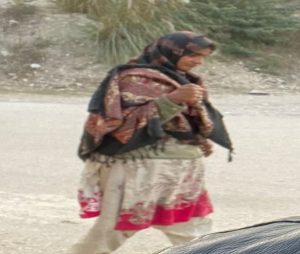







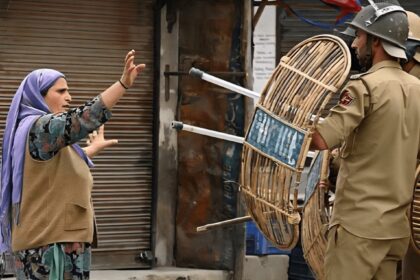

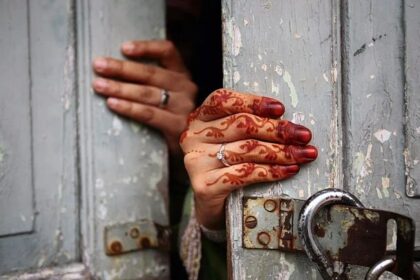



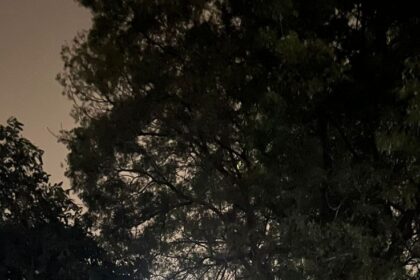



A heart moving highlight over sighted by thousands daily in Sukkur City.
#Sukkur